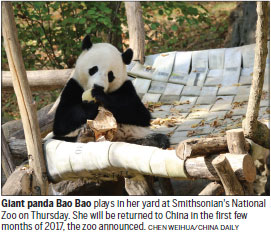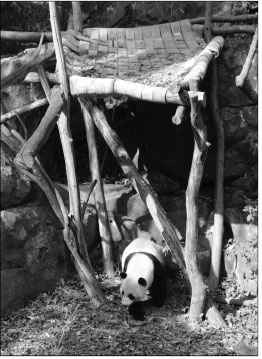Bao Bao to say bye-bye to US
By Chen Weihua in Washington (China Daily USA) Updated: 2016-10-21 11:40
It might be a difficult few months ahead for panda fans in Washington after the Smithsonian's National Zoo announced on Thursday that giant panda Bao Bao will be leaving for China sometime in early 2017.
As part of the cooperative breeding agreement between the zoo and the China Wildlife Conservation Association, all cubs born at the zoo move to China when they are 4 years old. Bao Bao turns 4 on Aug 23, 2017.
Bao Bao was strolling in her yard at noon on Thursday when a zookeeper called her by name and threw an apple juice popsicle to her. Taking her time, she found the treat and started to suck on it casually in the sun, delighting a large crowd of visitors.
The zoo will announce special opportunities for the public to say goodbye and celebrate Bao Bao before she leaves for China.
"Bao Bao is very special to us at the Smithsonian's National Zoo," said Brandie Smith, associate director of animal care sciences at the zoo. "She was the first surviving cub born at the zoo since 2005. She's captured the hearts of people all over the world who watched her grow up on the panda cams, and she has been an ambassador for conservation. We are sad to see her go, but excited for the contributions she is going to continue to make to the global giant panda population."
Six-year-old John Jackson of Washington was on a field trip to the zoo on Thursday. After learning that Bao Bao was leaving in a few months, the boy said he will miss her.
Kat Torre, a teenager visiting from Los Angeles, said it was a good thing that Bao Bao was returning to her original home in China. "They are here temporarily to educate people about them," she said.
Smith, who has worked at the zoo for more than eight years, described Bao Bao as always being very independent. "We noticed that when she was just little cub. She likes to do things on her own. She wasn't very interactive with her keepers," she said.
She said it was especially true in comparison with her little brother Bei Bei. "Bei Bei loves his keepers. He loves interacting with them, kind of play with them through the mesh," Smith said of the 14-month-old cub.
Both cubs received special attention from the first ladies of China and the US, Peng Liyuan and Michelle Obama.
When Bao Bao was named 100 days after her birth, the two first ladies sent congratulatory messages through videos. They also visited the zoo in September of 2015 and named the newly born cub Bei Bei. Last August, they sent messages on Bei Bei's first birthday.
To make sure Bao Bao is comfortable and safe on her upcoming journey, panda keepers are already getting her ready.

Her travel crate will be placed in the habitat and at first, keepers will get Bao Bao to walk through it every day. After she has gotten used to walking through it, they will acclimate her to spending short periods of time in it with the door closed and the keepers offering her treats.
When Bao Bao departs for China, she will be accompanied by one panda keeper and one veterinarian in a FedEx flight from Washington to the southwestern China city of Chengdu.
Bao Bao will enter the giant panda breeding program when she reaches sexual maturity between 5 and 6 years old.
Smith described the giant panda facilities in China as "spectacular" and "wonderful".
"So we are excited for her to go there," she said, adding that the bamboo in China is incredible and Bao Bao will be happy when she gets her first taste of it. Taishan, the giant panda who returned to China from the National Zoo in 2010, has adjusted very well in China.
Smith said one of the best things about the breeding program is "how closely we work with our colleagues in China and the great relationship that we've developed and how we share information back and forth."
"It has been really a privilege to be part of the panda program," she said.
Smith acknowledged how much she and visitors will miss Bao Bao, but she said it was like parents seeing kids going off to college.
"Every concerned parent sympathizes with this, right? It's a hard thing to do. You don't want them to go. But you know it's the best thing for them because they have to grow up and grow up on their own, and start their own families," she said.
"That's what Bao Bao is doing. She is growing up and she is going to have her own family and produce more pandas," she said.
Giant pandas were previously listed as an endangered species but changed to "vulnerable" status in the wild a few months ago by the International Union for Conservation of Nature. There are an estimated 1,800 giant in the wild.
Prior to Bao Bao's departure, giant panda twins Mei Lun and Mei Huan at Zoo Atlanta in Georgia will leave for China next month. The first US-born surviving pair of giant panda twins will be departing for the Chengdu Research Base of Giant Panda Breeding in China.
Four US zoos - in Washington, Atlanta, Memphis and San Diego - now house giant pandas.
chenweihua@chinadailyusa.com
- 'Cooperation is complementary'
- Worldwide manhunt nets 50th fugitive
- China-Japan meet seeks cooperation
- Agency ensuring natural gas supply
- Global manhunt sees China catch its 50th fugitive
- Call for 'Red Boat Spirit' a noble goal, official says
- China 'open to world' of foreign talent
- Free trade studies agreed on as Li meets with Canadian PM Trudeau
- Emojis on austerity rules from top anti-graft authority go viral
- Xi: All aboard internet express











